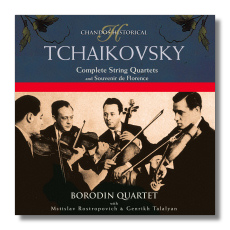
The Internet's Premier Classical Music Source
Related Links
- Tchaikovsky Reviews
- Latest Reviews
- More Reviews
-
By Composer
-
Collections
DVD & Blu-ray
Books
Concert Reviews
Articles/Interviews
Software
Audio
Search Amazon
Recommended Links
Site News
 CD Review
CD Review
Piotr Ilyitch Tchaikovsky

The Three String Quartets
- Quartet for Strings #1 in D Major, Op. 11 (1871)
- Quartet for Strings #2 in F Major, Op. 22 (1874)
- Quartet for Strings #3 in E Flat minor, Op. 30 (1875)
- Sextet for Strings "Souvenir de Florence" in D Major, Op. 70 (1890)
- String Quartet Movement
Borodin Quartet
Genrikh Talalyan, viola
Mstislav Rostropovich, cello
Chandos CHAN9871 ADD 2CDs: 75:39, 69:56
Unfortunately, Chandos does not indicate the year in which these recordings were made. The four original members of the Borodin Quartet appear here. They are violinists Rostislav Dubinsky and Yaroslav Alexandrov, violist Dmitry Shebalin, and cellist Valentin Berlinsky. This was the Quartet's lineup between 1953 and 1974. There are recordings of these works by later incarnations of the Borodin Quartet. On an EMI release, recorded by Melodiya between 1978 and 1980, the original violinists have been succeeded by Mikhail Kopelman and Andréi Abramenkov. There's an even later release on Teldec. My guess is that the recordings reviewed here date from the mid-1960s, or possibly earlier.
It's a surprise, but there are few competing recordings of these works available right now. Souvenir de Florence is one of the most enjoyable pieces of chamber music around, and the First Quartet's Andante cantabile is an evergreen. I suppose this music seems old-fashioned or salon-like to today's more sophisticated (?) listeners. Could it be that the Borodin Quartet has intimidated most of the competition, not just with quantity, but also with quality?
Actually, if you tend to be embarrassed by Tchaikovsky's emotionality, then these performances will be far too rich for you. It's a matter of taste. The Borodins seem to be transported by the sorrow, wistfulness, and manic joy of these works - nothing is kept on ice. "Seem to" are important words, however, because musicianship that is this intense can easily become sloppy, and there's no slop here. Four soulful individuals dig right in to play as one person, with no faults in ensemble or in rhythmic vitality. This isn't the polite concertizing that most modern students learn in their conservatoires. This is playing that is thrilling, chance-taking, and on the edge - a high-wire act in music, but one that is free of ego. There's never a false step to send the Borodin Quartet's members plunging into the realms of the ordinary. Talalyan and Rostropovich, who join the Quartet for Souvenir de Florence, are similarly unbridled.
The engineering is not bad. Chandos has digitally remastered these recordings, and the biggest distraction is the lack of a silent background. You know you are listening to an older recording before the playing actually starts. You forget everything but the music, however, once it does.
If you need this repertoire, you can hardly do better than these recordings.
Copyright © 2001, Raymond Tuttle


















